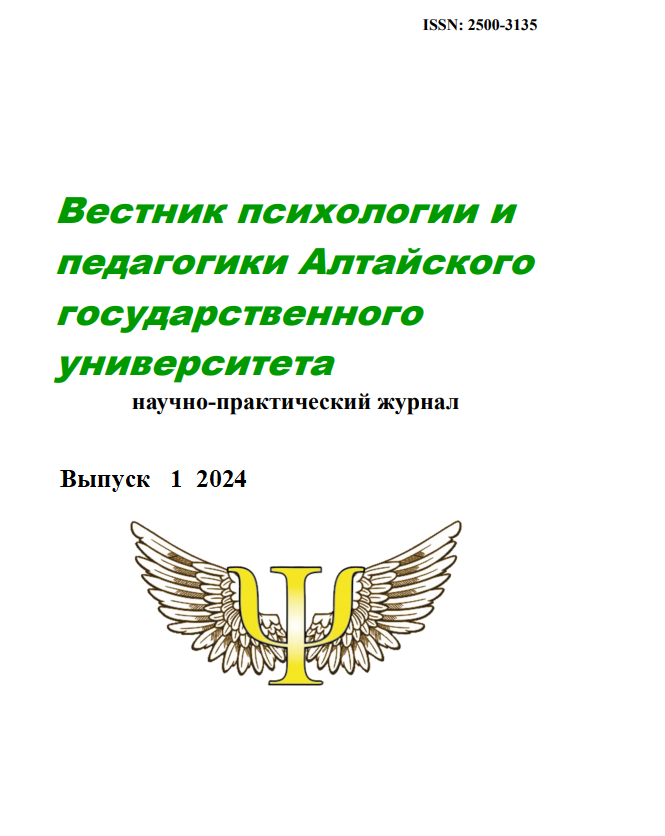ENHANCING PEDAGOGICAL EDUCATION IN CLASSICAL UNIVERSITIES THROUGH THE FEDERAL INNOVATION PLATFORM
УДК 378
Abstract
The article underscores the significance of the Federal Innovation Platform (FIP) within the framework of pedagogical education at classical universities. It elucidates how this platform influences the modernization of various educational components. By examining the innovative essence of the FIP, the article demonstrates how it establishes a distinct trajectory and standard for the development of pedagogical education within classical university systems. The FIP is shown to shape the methodological underpinnings, value-driven principles, substantive characteristics, and procedural elements of pedagogical education. Furthermore, the article highlights that the primary outcome of the FIP's initiatives is the transformation of the quality of teacher education, leading to the cultivation of educators suited for the demands of the contemporary era. The FIP plays a pivotal role in redefining the training process to produce Teachers of a new generation, equipped with the skills and knowledge necessary to excel in the evolving educational landscape.
Downloads
References
Аверина Л.В. Роль Федеральной инновационной площадки в системе дополнительного образования // Вестник Самарского государственного технического университета. 2018. Серия: Психолого-педагогические науки. Том 15, №3. С. 6–18.
Федеральный закон от 29.12.2012 N 273-ФЗ (ред. от 25.12.2023) "Об образовании в Российской Федерации" (с изм. и доп., вступ. в силу с 01.01.2024). URL:https://www.consultant.ru/document/cons_doc_LAW_140174/a9a28ae49b86df0327132598d1e9b42bffda4ab6/
Игнатьева Г.А., Мольков А.С. Инновационная площадка как место встречи практикоориентированной науки и наукоорентированой практики // Историческая социально-образовательная мысль. 2012. № 3 (13). С. 109–113.
Концепция подготовки педагогических кадров для системы образования на период до 2030 года. Распоряжение Правительства Российской Федерации от 24.06.2022 г. № 1688-р. URL: http://government.ru/docs/all/141781/
Лавина Т.А., Захарова А.Н., Грицкевич Т.И. Современное педагогическое образование: анализ трендов развития (по материалам лучших практик работы федеральных инновационных площадок) // Вопросы образования и психологии: монография. Чебоксары: Общество с ограниченной ответственностью «Издательский дом «Среда», 2021. С. 15–31.
Мазниченко М.А., Дубовицкая Т.Д. Анализ деятельности федеральных инновационных площадок на базе университетов // Профессиональное образование в России и за рубежом. 2023. № 1 (49). С. 153–161.
Морозова О.П. Подготовка «элитных» педагогических кадров в классическом университете как гарант устойчивого развития региона // Мир науки, культуры и образования. 2022. № 3 (94). URL: https://cyberleninka.ru/article/n/podgotovka-elitnyh-pedagogicheskih-kadrov-v-klassicheskom-universitete-kak-garant-ustoychivogo-razvitiya-regiona
Морозова О.П. Развитие педагогического образования в классическом университете: инновационные модели подготовки учительских кадров // Молодые университеты на пути инновационного развития: история и современность: матери-алы Международной науч.-практ. конфции: АлтГУ, Барнаул, 2023.
Новиков А.Н. Методология образования. Москва: Эгвес, 2008. 488 с.
Русских Г.А, Береснева Е.В., Шукшанова Е.Г. Инновационная площадка как средство профориентационной работы института естественных наук ВятГГУ // Концепт. Спецвыпуск. 2016, № 01. URL: https://cyberleninka.ru/article/n/innovatsionnaya-ploschadka-kak-sredstvo-proforientatsionnoy-raboty-instituta-estestvennyh-nauk-vyatggu
References:
Averina L.V. Rol' Federal'noy innovatsionnoy ploshchadki v sisteme dopolnitel'nogo obrazovaniya. Vestnik Samarskogo gosudarstvennogo tekhnicheskogo universiteta. 2018. Seriya: Psikhologo-pedagogicheskie nauki. Vol. 15, No 3. P. 6–18.
Federal'nyy zakon ot 29.12.2012 N 273-FZ (red. ot 25.12.2023) "Ob obrazovanii v Rossiyskoy Federatsii" (s izm. i dop., vstup. v silu s 01.01.2024). URL: https://www.consultant.ru/document/cons_doc_LAW_140174/a9a28ae49b86df0327132598d1e9b42bffda4ab6/
Ignat'eva G.A., Mol'kov A.S. Innovatsionnaya ploshchadka kak mesto vstrechi praktikoorientirovannoy nauki i naukoorentirovanoy praktiki. Istoricheskaya sotsial'no-obrazovatel'naya mysl'. 2012. No 3 (13). P. 109–113.
Kontseptsiya podgotovki pedagogicheskikh kadrov dlya sistemy obrazovaniya na period do 2030 goda. Rasporyazhenie Pravitel'stva Rossiyskoy Federatsii, 24.06.2022. No 1688-r. URL: http://government.ru/docs/all/141781/
Lavina T.A., Zakharova A.N., Gritskevich T.I. Sovremennoe pedagogicheskoe obrazovanie: analiz trendov razvitiya (po materialam luchshikh praktik raboty federal'nykh innovatsionnykh ploshchadok). Voprosy obrazovaniya i psikhologii: monografiya. Cheboksary: LLC Izdatel'skiy Dom Sreda, 2021. P. 15–31.
Maznichenko M.A., Dubovitskaya T.D. Analiz deyatel'nosti federal'nykh innovatsionnykh ploshchadok na baze universitetov. Professional'noe obrazovanie v Rossii i za rubezhom. 2023. No 1 (49). P. 153–161.
Morozova O.P. Podgotovka elitnykh pedagogicheskikh kadrov v klassicheskom universitete kak garant ustoychivogo razvitiya regiona. Mir nauki, kul'tury i obrazovaniya. 2022. No 3 (94). URL: https://cyberleninka.ru/article/n/podgotovka-elitnyh-pedagogicheskih-kadrov-v-klassicheskom-universitete-kak-garant-ustoychivogo-razvitiya-regiona
Morozova O.P. Razvitie pedagogicheskogo obrazovaniya v klassicheskom universitete: innovatsionnye modeli podgotovki uchitel'skikh kadrov. Proceed. Int Sc.
Bulletin of Psychology and Pedagogy of Altai State University is a golden publisher, as we allow self-archiving, but most importantly we are fully transparent about your rights.
Authors may present and discuss their findings ahead of publication: at scientific conferences, on preprint servers, in public databases, and in blogs, wikis, tweets, and other informal communication channels.
Bulletin of Psychology and Pedagogy of Altai State University allows authors to deposit manuscripts (currently under review or those for intended submission) in non-commercial, pre-print servers such as ArXiv.
Authors who publish with this journal agree to the following terms:
- Authors retain copyright and grant the journal right of first publication with the work simultaneously licensed under a Creative Commons Attribution License that allows others to share the work with an acknowledgement of the work's authorship and initial publication in this journal.
- Authors are able to enter into separate, additional contractual arrangements for the non-exclusive distribution of the journal's published version of the work (e.g., post it to an institutional repository or publish it in a book), with an acknowledgement of its initial publication in this journal.
- Authors are permitted and encouraged to post their work online (e.g., in institutional repositories or on their website) prior to and during the submission process, as it can lead to productive exchanges, as well as earlier and greater citation of published work (See The Effect of Open Access).







